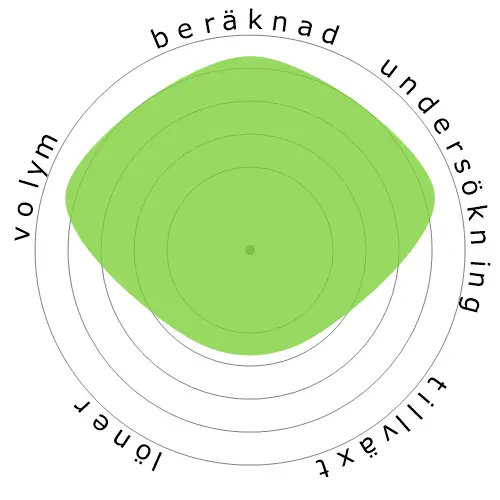Lärare på högstadiet, förutom special- och yrkes-/teknikutbildning




Personer tittade också på
Beräknad automatiseringsrisk
Minimal risk (0-20%): Yrken i denna kategori har en låg sannolikhet att automatiseras, eftersom de vanligtvis kräver komplex problemlösning, kreativitet, starka mellanmänskliga färdigheter och en hög grad av manuell skicklighet. Dessa jobb involverar ofta komplexa handrörelser och exakt koordination, vilket gör det svårt för maskiner att replikera de nödvändiga uppgifterna.
Mer information om vad detta betyg är, och hur det beräknas finns tillgängligt här.
Användarundersökning
Våra besökare har röstat att det är en låg chans att detta yrke kommer att automatiseras. Detta bedömning stöds ytterligare av den beräknade automationsrisknivån, som uppskattar 16% chans för automation.
Vad tror du är risken med automatisering?
Vad är sannolikheten att Lärare på högstadiet, förutom special- och yrkes-/teknikutbildning kommer att ersättas av robotar eller artificiell intelligens inom de närmaste 20 åren?
Känsla
Följande graf inkluderas där det finns en betydande mängd röster för att ge meningsfull data. Dessa visuella representationer visar användaromröstningsresultat över tid och ger en viktig indikation på sentimenttrender.
Känslor över tid (årligen)
Tillväxt
Antalet 'Secondary School Teachers, Except Special and Career/Technical Education' jobböppningar förväntas att minska med 0,6% fram till 2033
Total sysselsättning och uppskattade jobböppningar
Uppdaterade prognoser beräknas 09-2025.
Löner
I 2023 var den medianårliga lönen för 'Secondary School Teachers, Except Special and Career/Technical Education' 65 220 $, eller 31 $ per timme.
'Secondary School Teachers, Except Special and Career/Technical Education' betalades 35,7% högre än den nationella medianlönen, som låg på 48 060 $
Löner över tid
Volym
Från och med 2023 var det 1 045 170 personer anställda som 'Secondary School Teachers, Except Special and Career/Technical Education' inom USA.
Detta representerar cirka 0,7% av den anställda arbetskraften i hela landet
Sagt på ett annat sätt, runt 1 av 145 personer är anställda som 'Secondary School Teachers, Except Special and Career/Technical Education'.
Arbetsbeskrivning
Undervisa ett eller flera ämnen till studenter på gymnasienivå.
SOC Code: 25-2031.00


Kommentarer
Leave a comment
Due to remote learning and using similar designs that you mentioned, we have seen a 210% spike in high school drop outs, a 600% up shot of kids having at least 2-3 failing grades, and a gap between students who do not have access to tutors, internet or computers (or all three). A robot cannot tell an elementary student to reengage their students, let alone the sheer horror of classroom discipline being thrown out. Also, lets be real honest with secondary students, if they are given a generic problem trust me they will plagiarize and copy that down (just look at quizlet, or "write my paper" for proof). A human being needs to see if a student "gets" what is going on. A Teacher needs to have group interactions (and trust me you cannot do any sort of interactions with remote even with current programs- students just shut their cameras and mute themselves). Unless you are suggesting that a "few" will benefit from this dystopia, if so thank you Nancy Devos for your insight, but we educate everyone, and not the 1%.
Do you think the software being used led to those changes or the pandemic and economic downturn itself?
Easy to pass judgment when you have already drawn your conclusions. I've taught off and on since 2008 (mostly on, mostly secondary). Quizlet is the worst example you could provide of instructional technology we could employ to help all students.
When you discuss the one percent, you highlight a certain security the wealthy have that leads to less interruptions of education and that's a fair point. But I am not trying to describe a dystopia, but rather a better way to differentiate and tailor student learning to their particular needs, desires, strengths, and weaknesses.
Much of what effective teachers do is driven by inputs, points of data, about their students and their teaching. A properly designed system could analyze those inputs and apply strategies to intervene. It doesn't really matter the input, either.
Now that we are rolling out SEL technologies to help our kids, language translation applications that can help English learners, standards-based, interactively branching assessments and activities, the amount of information received is nothing trivial. The digital divide does truly make this a difficult prospect for some students, but that's not the question we are discussing here. Can teachers be replaced by "robots" in the future? Yes. Nothing would be more student-centred.
If the argument is about the socialization of students, that's not facilitated by teachers. It's actually stunted. Imagine learning plans that don't waste time with sages on stages. Imagine a truly adaptive system to check for understanding and intervene. Imagine that happening simultaneously for all students without the interruptions all teachers face daily just trying to teach. I realize virtual, and hybrid, learning did not go well for all students, but it was year one...something never attempted, and there was a society gone wild coupled with the inexperience of systems, personnel, and students.
I love teaching. I take it personally. But, if students were able to learn better from a robot than from me, I wouldn't take it personally. I'd celebrate it.
Learning with a teacher can mean a number of scenarios, including utilizing the learning software you mentioned.
The assurance of having someone who knows more than you, or at least knows where to find answers and explain them, will result in teachers have a very secure job.
I haven't even mentioned the emotional support and connection that makes a learning environment better, something I don't foresee AI replacing because seeing assuring words pop up on my screen is not the same as hearing it from a teacher, who is making eye contact with me and using body language.
Lämna ett svar om detta yrke